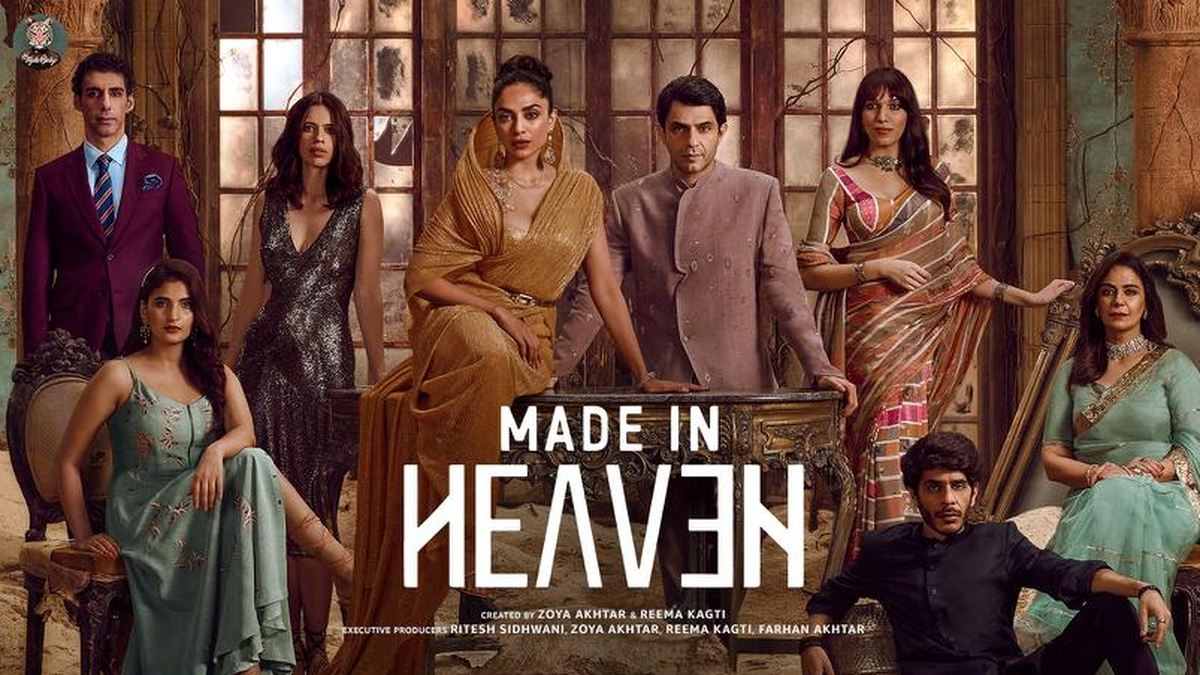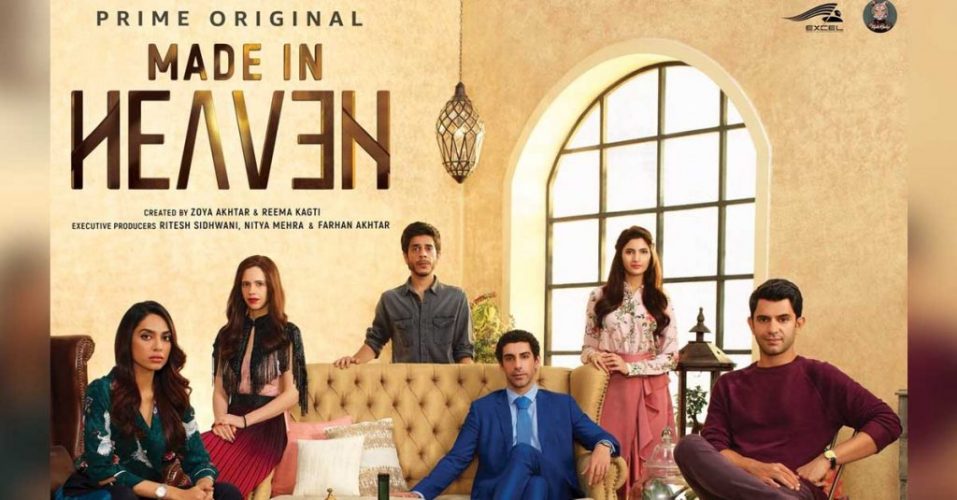CAST: Sobhita Dhulipala, Arjun Mathur, Jim Sarbh, Kalki Koechlin, Shashank Arora, Shivani Raghuvanshi, Mona Singh, Vijay Raaz, Pulkit Samrat, Anurag Kashyap, Neelam Kothari, Samir Soni, Elli Nourani, Mrunal Thakur, Mukul Chadha, Parvin Dabas, Dia Mirza, Sarah Jane Dias, Sanjay Kapoor, Jim Sarabh, Kalki Koechlin, Trinetra Haldar, Radhika Apte, Ishwaq Singh
DIRECTORS: Reema Kagti, Zoya Akhtar, Alankrita Shrivastava
It has been a span of four years since the debut of “Made in Heaven” on Prime Video, introducing us to the dynamic duo of Karan and Tara, along with their team of meticulous wedding planners. As we step into Season 2, we find ourselves merely six months ahead of where we last left the bustling confines of the Made in Heaven office, helmed by the talented portrayals of Arjun Mathur and Sobhita Dhulipala.
Crafted by the masterful minds of Reema Kagti and Zoya Akhtar, who not only conceived the series but also take up the director’s chair, Season 2 propels us forward while keeping our connections intact with the characters we’ve grown to adore. They are joined by co-writer Alankrita Shrivastava, as well as the directing talents of Nitya Mehra and Neeraj Ghaywan.
As previously established, each of the seven episodes is ingeniously woven around a specific set of wedding festivities. Yet, the brilliance of the show lies in its skillful weaving of intricate social themes, ranging from patriarchal norms and entrenched sexism to the struggle for gender equality and the haunting specter of caste-based biases. All of these issues are handled with remarkable sensitivity, further enriching the storytelling.
Set against the backdrop of opulent and extravagant weddings that illuminate the elite echelons of Delhi’s society, the episodes unfold like a symphony, balancing the splendor of celebrations with the gravity of the underlying societal issues. The juxtaposition of these lavish ceremonies and the profound questions they raise provides a thought-provoking canvas for the characters to navigate, making Season 2 a continuation that doesn’t just maintain the standard set by its predecessor, but raises it to even greater heights.
Season 2 delves deeper into the lives of Tara and Karan, the founders of the wedding planning agency of the same name. The brilliance of this season lies in its ability to balance the glittering spectacle of lavish ceremonies with the raw emotional turbulence beneath the surface. As the protagonists grapple with their own personal demons, the show masterfully intertwines their growth with the various narratives of the weddings they’re orchestrating.
The character arcs continue to shine in this season, especially in the case of Tara (Sobhita Dhulipala) and Karan (Arjun Mathur). Both actors deliver exceptional performances, capturing the nuances of their characters’ complexities and inner battles. The chemistry and camaraderie between them remain the heart of the show, and their evolving friendship adds an extra layer of depth to the narrative.
While the first season laid the groundwork for addressing societal issues, the second season takes a bolder stance in exploring themes such as LGBTQ+ rights, gender inequality, and political corruption. The showrunners are unafraid to confront uncomfortable truths, sparking conversations on subjects that have often been brushed under the carpet in Indian society.
The canvas of creativity remains rich and captivating in aspects such as production design, locations, costumes, and music – a veritable treasure trove of inspiration for those awaiting their bridal moments. Yet, these elements serve as mere embellishments. The true power of the show emanates from its intricate writing and the stellar performances delivered by the returning ensemble.
Though the spotlight often falls on brides, grooms, and their families, portrayed skillfully by talents like Radhika Apte, Mrunal Thakur, Mukul Chadha, Parvin Dabas, Dia Mirza, Sarah Jane Dias, Neelam Kothari, and Sanjay Kapoor, the sophomore season directs its gaze more intently towards the lives and romances of the Made In Heaven team.
Tara, brought to life by Sobhita Dhulipala, grapples with the aftermath of her fractured marriage to the businessman Adil, played by Jim Sarbh, who embarks on a new journey with Faiza, portrayed by Kalki Koechlin. On the other hand, Karan, portrayed by Arjun Mathur, continues his quest for parental acceptance as a gay man, his emotional landscape marked by past wounds as he seeks both solace and companionship. This shift in focus deepens the exploration of characters, offering a more intimate and profound understanding of their personal journeys.
Jazz, portrayed by Shivani Raghuvanshi, undergoes a transformative coming-of-age journey, while Kabir, portrayed by Shashank Arora, discovers the awakening of his creative voice. Jauhari, brought to life by Vijay Raaz, introduces a fresh narrative thread by bringing his wife Bulbul, played by Mona Singh, into the fold as the company’s auditor, which adds an intriguing layer of storytelling.
Trinetra Haldar shines as Meher, the skilled production head at Made in Heaven, who grapples with her journey of self-acceptance as a trans woman. However, Ishwak Singh’s addition to the cast falls a bit short, with a role that unfortunately doesn’t fully showcase his acting prowess.
Once again, it’s Karan’s character arc that stands out as the most intricate, and Arjun Mathur’s portrayal masterfully builds upon the nuanced writing, adding deep emotional layers to his character. Shashank Arora also delivers a spot-on performance as the wedding videographer with dreams of becoming a filmmaker, as he navigates his own complex and privileged position. Jim Sarbh, Kalki Koechlin, Shivani Raghuvanshi, and Vijay Raaz return to their roles, allowing their characters to organically evolve. Mona Singh’s introduction as Bulbul adds a crafty dimension to the ensemble. One of the triumphs of the writing lies in Tara’s choices, which challenge viewers’ preconceptions and elicit a range of judgments and reactions.
The season continues to adeptly execute its mission. It offers a plethora of social observations, some concealed beneath the veneer of designer fashion while exposing others to their raw reality. Beyond the rituals and fairy-tale endings, and amidst the acknowledgment that not all unions are destined in the heavens, the second season seamlessly underscores the intricate dance of parent-child relationships, all the while championing equality and the courage to stand up for one’s rights. One can only hope that the next iteration of the show won’t keep its eager audience waiting for too long.









